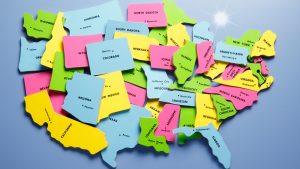It’s never too early to think about filing your taxes. For the 2023 tax year filing, we summarize below the changes relating to Business Meals, RMDs, CA Enterprise Zone Credits, and Bonus Depreciation. Starting in January 2024, the new “Beneficial Ownership” reporting requirement takes effect.
Give our offices a call if you have any questions.
CHANGES FOR 2023 TAX FILING
Some Business Meals Move Back to 50% Deductible
For tax years 2021 and 2022, all business meals were 100% deductible. Starting in 2023, you should have already adjusted your accounting to separate meals that are 50% deductible versus 100% deductible.
Meals that are 100% deductible:
- Food for employee events (office parties, team building events, etc.)
- Meals provided for the convenience of the employer. Examples are meals provided while employees work late (so they don’t have to leave and get food).
Note: During the past two years, we might have stopped separating these meals from a client meal. Now that these deductions are not all at 100%, we need to make sure to separate them. Otherwise, you might lose a deduction if we include all meals as a 50% deduction when some could have been at 100%.
Meals that are 50% deductible are:
- Business meals with customers,
- Meals provided for in-office meetings,
- Meals while traveling for work.
Note: Entertainment is still non-deductible and should always be separated from meal expenses.
Required Minimum Distributions (RMDs)
We have to clarify the changes to the age requirements for taking your Required Minimum Distribution (RMD). Recall that an RMD is the minimum amount of money you must withdraw from a tax-deferred retirement plan and for which you must pay tax at ordinary income rates. As you’re aware, the SECURE 2.0 Act raised the RMD boundary age to 73 (notably if you turn 72 after 12/31/2022). It began at 70.5, then climbed to 72, and now it is 73.
Note: Be sure to ask your LSL advisor which applies to you. With the recent changes, you may get conflicting information from friends or the internet.
CA Enterprise Zone Credits
The CA Enterprise Zone was repealed in 2013, and a 10-year carryover was put in place. Credits that were generated in 2013 or earlier will expire in 2023. Credits generated in 2014 and later expire 10 years from the year the credit was generated. For many employers, the bulk of these credits were generated before 2013, so 2023 could be the last year to use a large portion of these credits.
Bonus Depreciation (BD)
Bonus depreciation—the accounting method allowing businesses to write off a percentage of the cost of certain assets in the year the property is in service is specified in Internal Revenue Code (IRC) Section 168(k). The August 18, 2023, Congressional Research Service report summarizes the changes for items placed in service in 2023. That amount you can expense moves for the 2023 tax year to 80% from 100%. The allowable percentage will be reduced to 60% in 2024, 40% in 2025, 20% in 2026, and 0% starting in 2027). For IRS FAQ documentation, the link is here.
Note: The IRC Section 179 bonus depreciation is still available with a 100% write-off but has more restrictions than 168(k), the two limitations being an investment and an income limitation. The form for claiming the Section 179 expensing allowance is IRS Form 4562. Your tax adviser will help you with this and other forms, as some properties with longer production times might bypass the 2027 0% rule. It’s best to check and double-check because it’s complicated.
2024 BENEFICIAL OWNERSHIP
(This rule impacts your 2024 business filing. It is not part of your tax return.)
Why is this happening?
Starting in 2024, newly formed entities will have to report beneficial ownership to FinCEN (Financial Crimes Enforcement Network). FinCEN is a bureau of the U.S. Department of the Treasury.
“… the rule will enhance the ability of FinCEN and other agencies to protect U.S. national security and the U.S. financial system from illicit use and provide essential information to national security, intelligence, and law enforcement agencies; state, local, and Tribal officials; and financial institutions to help prevent drug traffickers, fraudsters, corrupt actors such as oligarchs, and proliferators from laundering or hiding money and other assets in the United States.”
Why doesn’t the IRS need this form? This filing is not part of your tax return because FinCEN is under the U.S. Department of the Treasury, not the IRS.
What is a beneficial owner?
A Beneficial Owner is an individual who either directly or indirectly (1) exercises substantial control over the reporting company or (2) owns or controls at least 25% of the reporting company’s ownership interests.
Timing notes: Reporting companies created or registered before January 1, 2024, will have one year (until January 1, 2025) to file their preliminary reports, while reporting companies created or registered after January 1, 2024, will have 30 days after receiving notice of their creation or registration to file their initial reports. Reporting is done electronically through the FinCEN’s website.
IMPORTANT NOTE: FinCEN is not accepting reports before January 1, 2024.
BRAND NEW GUIDE: The government’s 50-page “BOI (Beneficial Ownership information) Small Entity Compliance Guide” was published on September 18, 2023, and can be found here.
This helpful guide:
- Describes the BOI reporting rules,
- Answers key questions, and
- Provides interactive checklists, infographics, and other tools to assist businesses of all sizes with the BOI reporting rule.
If you use an attorney to set up the business entity, they might offer to complete or assist with these filings. Who is responsible for the filing It must be clear, as there will be penalties for not complying. Besides, with the country’s security at stake, everyone should be willing to collaborate in this endeavor.
Summary
These tax changes are the most visible and universally applicable for the upcoming 2023 reporting period. Taxes are unavoidable. Surprises are avoidable. Being prepared with warnings ahead of time helps prevent surprises.
As for the BOI Beneficial Ownership Information filing, we have to be thankful the U.S. Treasury is helping our country stay safe. These are brand new compliance rules, so there may be lots of questions.
Please call your LSL advisors so we can guide you.




